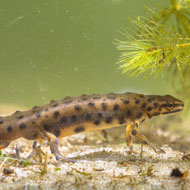
Bsal ‘impossible to stop’ once in a wild population
A deadly fungus that has decimated salamander populations could soon find its way to the UK, scientists are warning.
New research suggests that Batrachochytrium salamandrivorans (Bsal) is widespread in private amphibian collections in Western Europe.
Seven out of 11 collections tested positive for the fungus, according to findings published in Scientific Reports.
The infection has been transmitted between several countries and was discovered in Spain for the first time.
Scientists said they are concerned about the private trade in amphibians, as it could result in Bsal spreading to wild populations of newts and salamanders in the UK, with dire results for conservation.
Lead author Liam Fitzpatrick from the Zoological Society of London (ZSL), said: “Once the fungus is in a wild population it is likely to be impossible to stop its spread and the loss of susceptible species.
“We already know that Bsal can be lethal to a number of European salamander species, so understanding ways in which the fungus could be introduced to new areas is essential in our efforts to conserve wild amphibians.”
Bsal was responsible for a 99 per cent decline in one monitored population of fire salamanders in the Netherlands. Population declines have since expanded into Belgium and Germany.
Professor Andrew Cunningham, also from ZSL, said the “critical point” is to prevent Bsal from being introduced to collections in the first place.
It is estimated that 131,000 live amphibians were imported to the UK in 2006, with 98 per cent used for the legal pet trade.
Co-author Professor An Martel from Ghent University said: “Screening captive collections and treating Bsal positive individuals, along with engaging with collectors to improve sanitary protocols, are likely to be the most effective and feasible measures to protect both captive and wild salamanders and newts from Bsal.”



 The latest
The latest